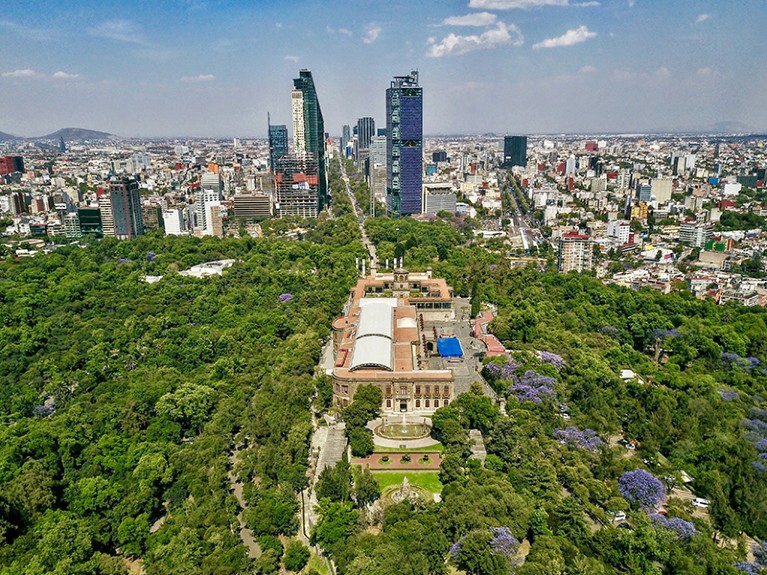
Mexico City has used research to inform policymaking for decades, but scientists struggle to get such work published in international journals.Credit: Getty
The numbers say it all: cities are hugely important to the world’s future but face big challenges. More than half of the world’s nearly eight billion people live in a city. Of those, 2.8 billion — the combined population of China and India — lack proper housing. For more than one billion individuals, home is in an informal settlement, and that number is rising. Some 90% live in Africa or Asia, according to 2020 data.
What’s more, few, if any, of the targets of the 11th United Nations Sustainable Development Goal (SDG 11) to “make cities and human settlements inclusive, safe, resilient and sustainable” are even within shouting distance of being achieved by the 2030 deadline. Some progress has been made in expanding access to public transport (currently available to around half of the world’s urban dwellers). However, “vast gaps” remain when it comes to achieving universal access to affordable homes, improving living conditions and reducing the environmental impact of cities, says the urban-development agency UN-Habitat (see go.nature.com/3srrcsq).
Want a sustainable future? Then look to the world’s cities
There are gaps, too, when it comes to cities and science. Low- and middle-income countries (LMICs) need the kind of knowledge-based decision-making that is routine in high-income countries. And yet most research expertise is concentrated in rich nations, notes Eduardo Cesar Leão Marques, a political scientist at the University of São Paulo, Brazil, in a review article in the inaugural edition of Nature Cities (E. C. L. Marques Nature Cities 1, 22–29; 2024).
This, in turn, makes it harder for researchers in LMICs to publish their research on regions such as Latin America in journals based in the United States, says María José Álvarez-Rivadulla, a sociologist at the University of the Andes in Bogotá who has worked on cities in both areas. This is at least in part because reviewers don’t see such articles as relevant to readers who are based mainly in high-income countries. “You have to keep justifying why you study the cities that you study, because they are not in the global north and your research isn’t based in a rich university in a rich country,” she says.
A second, related, problem is that most existing research in, on or about cities falls in disciplines that don’t focus exclusively on urban environments. Studies on governance, climate and sustainability, public health, transport and other topics relevant to cities can be found in publications, including the Nature Portfolio journals, that serve their respective communities. But there are few journals that speak to all those working in the urban space and consider urban challenges across social divides.
Progress towards the Sustainable Development Goals
That is where Nature Cities, which launched this month, aims to be different: it will publish research, commentary and journalism across the spectrum of urban issues. The journal intends to cross-pollinate the vast variety of urban-relevant research and thought and to reflect the variety and ways that scholars, practitioners and others are thinking about urban problems.
Take urban governance, which is an increasingly popular research topic. Participation in city governance by stakeholders from civil society and non-governmental organizations is key to achieving SDG 11. The good news is that city governments are being given more powers to make decisions that once might have sat with regional or national governments. Moreover, civil-society organizations are increasingly becoming involved, both in shaping and influencing policies and in providing services to communities. However, such engagement is under threat or becoming constrained in some regions, says UN-Habitat.
Clearly, there’s a mountain to climb on urban governance, boosting cities research in LMICs and reflecting under-represented voices in international research publishing. As part of our commitment to better highlight such challenges, last summer, the Nature Portfolio journals issued a call for papers on progress towards the SDGs. The aim is to energize the world’s research community so that it can play a bigger part in achieving them.
Cities are places where researchers and communities from different disciplines are having daily conversations — sometimes loudly, sometimes quietly, but often passionately. We hope that Nature Cities will provide a central square to do just that.

 Want a sustainable future? Then look to the world’s cities
Want a sustainable future? Then look to the world’s cities
 Progress towards the Sustainable Development Goals
Progress towards the Sustainable Development Goals
 Studying inequality in the city with María José Álvarez-Rivadulla
Studying inequality in the city with María José Álvarez-Rivadulla
 Continuities and transformations in the studies of urban politics and governments
Continuities and transformations in the studies of urban politics and governments




